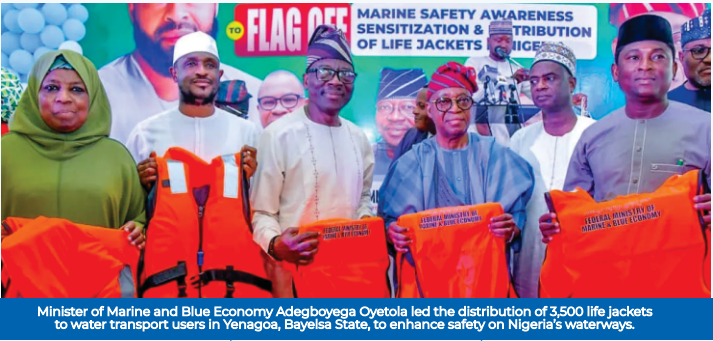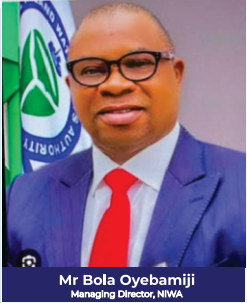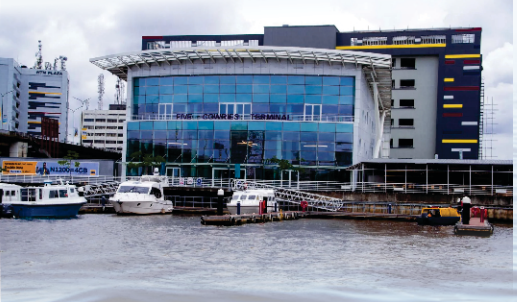
Silent Waters, Violent Toll
- Lead StoryMaritime
- July 21, 2025
- No Comment
- 189
Federal Government Moves to End Boat Mishaps
For thousands of Nigerians who rely on waterways, whether for trade, transport, or daily commuting, what should be a convenient and affordable means of travel has too often become a death trap. Over 1,350 lives have been lost to boat mishaps in just four years, a staggering figure that has cast a dark shadow over Nigeria’s inland waterways. Behind each statistic lies a story of broken families, sunken hopes, and preventable tragedy. Now, faced with mounting public concern and damning safety records, the Federal Government says enough is enough. In this exclusive interview by LANRE ABDUL AND SAMUEL BENJAMIN, key stakeholders speak on what has gone wrong, what must change, and the concrete steps being taken to make Nigeria’s waterways safer for all.
Boat mishaps have become a recurring decimal on Nigeria’s waterways with Kwara and Niger States being the hardest hit. The federal government has recently declared war on ending the frequent boat mishaps which have left thousands of people dead in Kwara, Niger, Kebbi, Lagos, Enugu, among others in recent times.
According to analysis of newspaper reports and data from official sources, no fewer than 1,351 have perished in the last four years (2021 – 2024) from different boat mishaps and accidents on waterways. As the waterway transportation system is becoming increasingly popular, the need for standardisation of the mode of transportation has become more imperative, according to experts and analysts.
Transport Agenda reports that Nigeria is blessed with abundant waterways criss-crossing 28 states and spanning 10,000 kilometres with about 3,800 kilometres “navigable seasonally,” according to the National Inland Waterways Authority (NIWA), the federal government agency responsible to “provide regulatory, economical and operational leadership in the Nation’s Inland Waterways system and develop infrastructural facilities for an efficient intermodal transportation system in line with global best practices that is safe, seamless and affordable.”
However, over time the sector has been dominated by informal players with little or no regulation despite the existence of the regulatory authorities.
The result of lack of regulation or under-regulation has been a harvest of deaths on the waterways across the country as a result of several boat mishaps which claimed over 1,350 lives in four years.
Chronicles of mishaps

In the last four years, there have been several incidents from waterways which triggered nationwide reactions and a call for action to mitigate the mortality rate in the waterways. The incidents happened in Lagos, Niger, Kwara, Kebbi, Adamawa, Nasarawa and Akwa Ibom.
In 2020 no fewer than 131 deaths were recorded with several others unaccounted for in several incidents in Anambra, Cross River, Bauchi, Lagos, Benue Niger, Sokoto, among others.
In 2021, 281 people died in different mishaps recorded in Sokoto, Bayelsa, Lagos, Kano, Niger, Taraba, Ondo, Kebbi, among others.
The Kebbi incident in 2021 in Warrah Village, Tsihuwan Labata, Ngaski LGA was the deadliest with 156 people dead.
The year 2022 also recorded hundreds of deaths with no fewer than 313 people killed while in 2023, 300 lives were lost according to a report by the Chartered Institute of Logistics and Transport.
In 2024, 326 people died from boat mishaps with Niger and Kwara accounting for most of the deaths, recording 92 and 90 deaths respectively.
Some of the deadliest and most devastating incidents in 2024 included the boat accident which occurred in Anam River in Anambra State on Wednesday, April 10, 2024.
It was conveying twelve actors and crew members and a boat operator before it crashed resulting in loss of five passengers including popular Nollywood actor, Mr. Paul Odonwodo, popularly known as Junior Pope.
Others who died in the incident were Ms. Abigail Frederick, Mr. Precious Oforum, and Mr. Joseph Anointing.
Patigi in Kwara
In June, 2023, there was a boat mishap in Patigi, Kwara State which was considered one of the deadliest with over 100 people killed.
The boat capsized when the deceased were returning from a marriage ceremony in the neighbouring Niger state.
About 106 people were confirmed dead in the boat mishap with 144 rescued, according to the Nigeria Safety Investigation Bureau (NSIB) which took over the investigation at the time.

Niger State
Niger State, North Central Nigeria has recorded some of the deadly crashes in recent history. In the year under review, the state has recorded several incidents which left dozens of people dead. For instance, in 2021, a boat mishap in Munya Local Government Area of the state led to the death of 35 people.
In 2023, more than 100 people were declared missing after a boat carrying mostly women and children capsized, killing 26 people.
The locally made wooden boat, with a capacity of 100 passengers, had about 300 people on board when it overturned in the rural Mokwa district.
Locals who spoke with Transport Agenda said water transportation is about the only means to convey farm produce in absence of road infrastructures in the rural communities.
“We are left with no other option except the use of boats. We know it is risky but do we have another option,” said a resident of Katcha, an agrarian community in Niger.
Sokoto
Sokoto state has had its fair share of boat mishaps. In recent year, 28 people died when a locally wooden boat capsized in Shagari River while only seven people survived in April 2022. The same year, another 15 people died in the same River in another boat accident. Also, in 2023, another 15 people from Dandeji Village lost their lives in another boat mishap, according to news reports.
Kebbi
Kebbi State featured prominently in the last four years with a series of boat mishaps and accidents. In 2021, the nation was thrown into mourning when 156 people died in a boat mishap at Warrah Village, Tsihuwan Labata,Ngaski LGA of the state while there were 20 survivors. The victims were mostly artisanal miners and traders.
The boat was carrying 180 passengers with 30 Bajaj motorcycles. The victims were going to a market in Malele in Borgu local government area of Niger state from Kebbi and the incident happened just one hour into their trip, according to emergency officials. Also in Kebbi, in 2023, 14 people died in another incident at Samanji River in addition to other pockets of incidents in the state.
Coming to the South, the eastern part of River Niger has become another hot bed for boat mishaps. In October 2022, 78 people were confirmed dead in River Niger precisely in Ogbaru Local Government Area of Anambra State when a boat carrying the passengers capsized with officials blaming the incident on overloading.
Anambra has especially witnessed a series of incidents with several of them unreported, according to locals. Also Cross River too has been in the news on account of boat mishaps while Rivers State has equally witnessed several boat mishaps.
Many stakeholders and experts have raised concerns over the increasing rate of accidents on the waterways which has left the transportation mode a no-go area for some Nigerians.
They highlighted the challenges on the waterways to include overloading of passengers and goods; night voyages by ferry operators; obstructions on waterways; violation of route usage; faulty boat and ferry engines; non usage of life jackets and other life-saving appliances, amongst others.
However, experts say the government must go beyond condemnations by strengthening regulations and entrenching an efficient safety system in the waterways.
In the preliminary report on the Anam River boat incident which killed the popular Nollywood actor, the Nigeria Safety Investigation Bureau (NSIB) in the report titled, “Preliminary report on a Boat Accident that occurred at one nautical mile from Onono jetty in Anambra West LGA, Anambra State en route Asaba jetty in Asaba, Delta State on 10 April 2024 at about 12:30 h,” made 15 findings which observers say remain at the heart of several boat mishaps in Nigeria.
The NSIB observed that: “The boat driver was not certified; the fibre boat was not registered with the National Inland Waterways Authority; The outboard engine fibre boat was carrying 12 passengers and one boat driver; there was only one person on the wooden fishing canoe. This rowdiness in the boat distracted the driver and he was not looking out as required; the boat was on high speed and the crossing canoe was moving at a much slower speed; The only occupant of the canoe, on sighting the fast approaching boat jumped into the river and escaped; The boat collided with the canoe at a high speed which resulted in the boat capsizing and all persons onboard were flung into Anam River.”
Other findings are that five passengers on the boat were fatally injured while the remaining seven passengers and the driver survived the crash.
“Only one passenger on the outboard engine fibre boat was wearing a life jacket; the only passenger wearing a life jacket came with it and was not provided by the operator; the passenger wearing the life jacket was one of the survivors; The boat was fitted with an outboard engine; there was no manifest of passengers and persons onboard the boat and rescue operation was not timely and there were no trained divers around to assist in the operation,” the report observed.
Analysts say this is at the heart of the several boat mishaps in Nigeria where safety culture is practically zero while hundreds of lives are lost year in, year out.
Professor of Transportation, Samuel Odewunmi said overloading was a major cause of boat mishap. He stated that most operators were fond of carrying beyond the capacity of their boats.
“Most of those boats, the operators carry more than their normal capacity. We normally have many of them that are overloaded. So with the smallest turbulence, the boat just capsizes.
“The second reason is the condition of those boats. If you go into history, there were cases when the engine just stopped midstream. This happens when there is high tide, in most of our rivers, the current is so high and when this happens, the boat starts drifting and what you have is capsizing.”
Another transportation expert, Prof. Bamidele Badejo described water transportation as the oldest means of transportation.

He noted that the advent of modern and new technology-driven transportation infrastructures like trains and air, has reduced the focus on water transportation.
He said, “But with the increasing cost of fuel, increasing difficulty in maintenance of vehicles with attendant increase in road public transport and positive contribution of technology to climate change, it threatens the survival and existence of man.
It is against this background that people must now take alternatives and resolve the water transportation system. We have to go back to water transportation but the current water infrastructure also discourages the use of water transportation.”
To make waterway transportation work, he stated that there was the need to improve the infrastructures on the waterways and institutionalise safety culture in order to reduce people’s phobia for water.

He said travelling by waterways especially in a Riverine state like Lagos is not only the cheapest but the fastest means of transportation within the city.
He said, “For example, Ijede in the Ikorodu area, Badore, and Lekki in Ajah are just five minutes by water but if you have to go by road, you have to go through Epe to Ajah, which is about 140 km. If you go through Ketu, follow through the Third Mainland Bridge, which is about 122 km.

So, it will take up to 5-6 hours. So alternatively is the water transportation that could have eased a lot of problems.
So, we need to focus on jetties and terminal development. We have to standardise the passage terrain that is used for water transportation. Standardization in the type of vessels, ferry boats they use, the safety requirements that must be attached to the ferry and all the technological applications such as radar to track whatever that is ahead of you on time so that you need to respond where there are cataracts, where there are log of woods, where there are outbursts.
Just like an aeroplane in the air captures the distance of clouds in the air and avoids it, we should be able to capture the cataracts and rapids of the water.
“In terms of lighting, if they have to go by night, what is the standard of the lights that must be provided? What about safety, if all these are there, we need to encourage people to use them and how do we encourage people to organise public enlightenment, engagement or education?
“If you don’t engage them or encourage them to use it, that means all your investment will come to a loss because you have not re-tuned their brain to let them know that it is safer to go by water. It has positive health implications, imagine someone that will go from Ijede to Badore within 12 minutes or someone who will drive for six hours, which one is healthier?
It also reduces costs. From Ikorodu, Ebute to Apapa Flour Mill it will take 27 minutes and it will take 8 hours by road because of traffic congestion.
So, in essence, for us to respond to the current challenges on the ground, water transportation is key.”
FG moves against persistent mishaps
The federal government has moved against the frequent boat mishaps with a view to stop the loss of lives on the waterways.
Minister of Marine and Blue Economy, Adegboyega Oyetola recently inaugurated a Special Committee on the Prevention of Boat Mishaps. The committee chaired by the Managing Director of the National Inland Waterways Authority (NIWA), Bola Oyebamiji includes representatives from state governments, the Association of Boat Operators in Nigeria, marine safety experts, and academics.
The Deputy Director of Inland Waterways at the Ministry of Marine and Blue Economy, Adams Offie, will serve as the committee’s secretary.
Oyetola lamented that the increasing number of boat mishaps has become an urgent national concern, calling for immediate and decisive action.
“Our inland waterways are vital for commerce, transportation, and livelihoods. Ensuring their safety is paramount to the success of our blue economy,” Oyetola said. “We can no longer afford to lose lives to preventable accidents. Safety on our waterways is non-negotiable.
The committee’s primary mandate is to conduct a comprehensive review of commercial boat operations, identify the root causes of mishaps, and recommend long-term solutions.
The NIWA Boss Oyebamiji pledged that the committee would deliver actionable recommendations to make Nigeria’s waterways safer.
“We are committed to ensuring the highest safety standards on our inland waterways. This committee will work diligently to address the causes of boat mishaps and implement lasting solutions,” he said.
Campaign on life jackets
For most of the recent mishaps, one major trend observed was the failure of passengers to wear life-jackets. This is why the federal government has recently flagged off an initiative to distribute 10,000 life-jackets.
The initiative, flagged off in Minna, Niger State, is part of a broader marine safety awareness campaign spearheaded by the Federal Ministry of Marine and Blue Economy.
He explained that the first phase of the intervention would involve the distribution of 3,500 life jackets to 12 selected states, including Niger State.
Why deaths persist on waterways – NIWA
The National Inland Waterways Authority (NIWA) has however assured that it is taking pragmatic measures to curb the spate of boat mishaps on the waterways.
The managing director, Bola Oyebamiji stated that most of the deaths recorded on the waterways in Nigeria were due to the nonuse of life jackets by passengers.
He said that was what necessitated the massive distribution of the jackets as part of measures to curb the menace and ensure safety on the waterways.
Oyebamiji said, “We began with distribution of thousands of life jackets in the Gbajibo Community in Niger after a boat mishap last year.
“This year, in collaboration with the Federal Ministry of Transport, Marine and Blue Economy, we launched the distribution of 42,000 jackets in Niger.”
Oyebamiji said, “Aside life jackets, NIWA had organised a retreat in Abuja, inviting all the 36 Commissioners of Transport to find solutions to how to curb incessant boat mishaps in the country.
“NIWA had also donated water ambulances and patrol boats to Niger and Kwara and four fibre sail boats to Kogi.
“We are trying to partner with fibre boat manufacturers in the United Kingdom and Nigeria, to stop the use of wooden boats in the country by local passenger boat operators to curb the incessant boat mishaps.”
He added that NIWA was laying water buoys across the country as a guide for boat operators, saying more than 1,500 bouys of different colours had been laid in parts of River Niger.
‘War against boat operators’
“In demonstration of the war against boat mishaps and destruction of lives and property, NIWA has decided to prosecute any boat operator that causes the death of innocent passengers on board.
“Just recently, we sued two boat operators before a Lokoja Chief Magistrates’ Court over the killing of 19 passengers in Kogi State on Nov. 29, 2024.
“The Kogi Police Command, through its NIWA wing, charged Musa Dangana and Yakubu Dangana, both residents of Lokoja, with conspiracy and negligence that led to a boat mishap that led to the death of 19 out of 60 passengers.
“Their trial was sequel to their failure to exercise due vigilance, in spite of several warnings against night journeys and traveling without life jackets, which we believe might have led to the lives lost,” he said.



